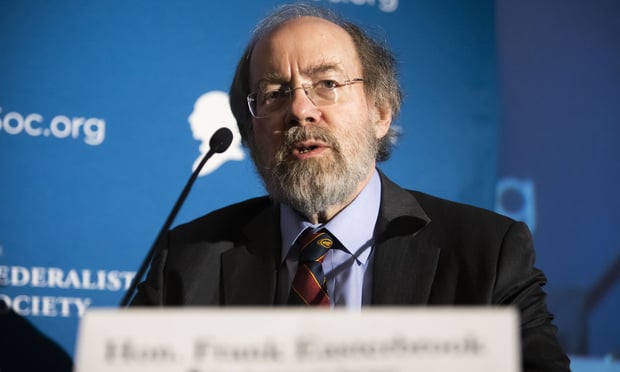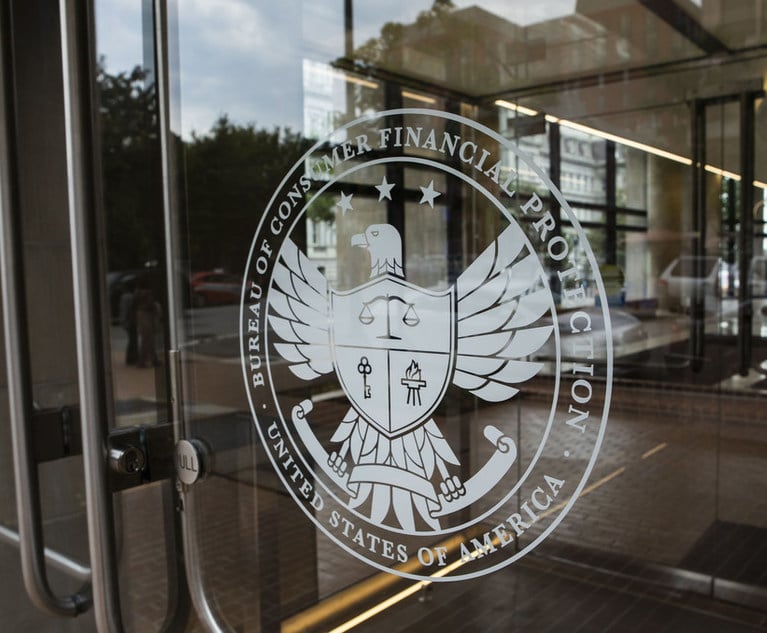US Appeals Court Stops Judge's Contempt 'Inquest' of CFTC Leaders
"If the commission has done wrong, that is because of what the commission itself said and did, not because of what any of its members or employees thought or planned," the Seventh Circuit panel said.
October 22, 2019 at 01:44 PM
5 minute read
 Heath Tarbert. Photo: Diego M. Radzinschi/ALM
Heath Tarbert. Photo: Diego M. Radzinschi/ALM
A federal appeals court on Tuesday stopped a Chicago trial judge from pursuing any civil contempt sanctions against ranking officials at the U.S. Commodity Futures Trading Commission, but the agency itself still faces an inquiry into whether certain public statements violated the terms of a $16 million settlement with two major food producers.
The U.S. Court of Appeals for the Seventh Circuit overturned an order compelling three Senate confirmed leaders—Chairman Heath Tarbert, a Republican, and Democratic Commissioners Dan Berkovitz and Rostin Behnam—to appear in court and testify about remarks they made about the settlement, despite a gag provision that limited what the commission could say publicly. The court said the trial judge can still assess whether the CFTC itself should be held in contempt.
The two companies, Kraft Foods Group Inc. and Mondelēz Global LLC, represented by lawyers from Jenner & Block and Eversheds Sutherland, argued the CFTC violated the settlement when commissioners made statements appearing in a trio of news releases. The agency has removed the news released pending the outcome of the contempt inquiry. The settlement resolved allegations of price manipulation in the wheat market.
"If the commission has done wrong, that is because of what the commission itself said and did, not because of what any of its members or employees thought or planned," the Seventh Circuit panel said Tuesday. Judge Frank Easterbrook, who wrote the opinion, was joined by Judges Kenneth Ripple and Diane Sykes.
The dustup marked a rare instance where a federal judge had ordered high-level U.S. officials to appear in court, and the dispute also put in focus whether and when federal agency leaders ever should agree to a settlement provision that limits what public officials can say about a deal with private companies. The CFTC has denied any public statements violated the terms of the settlement.
Tuesday's appeals court order directs U.S. District Judge John Robert Blakey of the Northern District of Illinois "to withdraw its demand that these persons appear in court for questioning."
"We also direct the district court to desist from any effort to hold the chairman, commissioners, and staff members personally in contempt of court, or otherwise to look behind the commission's public statements and the administrative record," Easterbrook said. The panel said its order was justified "when a district court has authorized an inquest into the internal deliberations of the executive branch's senior officials."
 Judge Frank Easterbrook. Credit: Diego M. Radzinschi /ALM
Judge Frank Easterbrook. Credit: Diego M. Radzinschi /ALMThe commission's public statements at issue included remarks such as: "The $16 million penalty is approximately three times defendants' alleged gain." And: "We are pleased to bring this matter to a successful resolution, which terminated more than four years of litigation." The commission issued a separate statement that said the agency would unlikely agree to a gag provision in the future "except in limited circumstances."
Jenner partner Dean Panos, leading the push for contempt sanctions, said in court filings in the case: "The CFTC and its commissioners engaged in a deliberate, orchestrated effort to violate the court's consent order within minutes of its entry."
Berkovitz, a former Wilmer Cutler Pickering Hale and Dorr partner, and Behnam, a former aide to U.S. Sen. Debbie Stabenow, D-Michigan, issued a separate statement about the Kraft and Mondelēz deal that criticized the gag order. "In our view, in future situations, the commission should not accept any confidentiality provisions or restrictions on the commission's ability to make public statements," they said.
Blakey has defended his move to question individual CFTC members and staff, including the enforcement director, about the agency's public statements.
"Obviously, I didn't set a hearing with the commissioners lightly (and granted continuances upon request)," Blakey told the Seventh Circuit panel. "But, under the extraordinary circumstances, where the high-ranking executive officials made some of the challenged statements and appeared to be in sole possession of the relevant information, I determined that it was the right call, at least prior to some convincing argument to the contrary by the CFTC."
A team from King & Spalding, including former U.S. Attorney Zachary Fardon, had represented the CFTC officials in the appeal challenging the contempt inquiry. It's not unusual for U.S. agency officials to retain outside counsel in scenarios, although rare, where individual sanctions—including contempt—are on the table.
Much of the contempt litigation had proceeded under seal until the Seventh Circuit ordered the docket to be opened up.
The appeals court rebuked Blakey for directing the lawyers in the case not to say anything about the contempt proceedings and to file court papers under seal. The three-judge panel said Blakey's order was "inconsistent with the law of this circuit."
Read more:
CFTC Takes Down Disputed Press Releases as Chicago Judge Mulls Sanctions
US Judge Weighs Punishing CFTC Over Statements About Settlement
This content has been archived. It is available through our partners, LexisNexis® and Bloomberg Law.
To view this content, please continue to their sites.
Not a Lexis Subscriber?
Subscribe Now
Not a Bloomberg Law Subscriber?
Subscribe Now
NOT FOR REPRINT
© 2025 ALM Global, LLC, All Rights Reserved. Request academic re-use from www.copyright.com. All other uses, submit a request to [email protected]. For more information visit Asset & Logo Licensing.
You Might Like
View All
SEC Official Hints at More Restraint With Industry Bars, Less With Wells Meetings
4 minute read
CFPB Resolves Flurry of Enforcement Actions in Biden's Final Week

Wells Fargo and Bank of America Agree to Pay Combined $60 Million to Settle SEC Probe
Trending Stories
- 1Harrisburg Jury Hands Up $1.5M Verdict to Teen Struck by Driver
- 2Former Director's Retaliation Suit Cleared to Move Forward Against Hospice Provider
- 3New York Judge Steps Down After Conviction for Intoxicated Driving
- 4Keys to Maximizing Efficiency (and Vibes) When Navigating International Trade Compliance Crosschecks
- 5Houston Law Firm Files $250K Breach of Contract Suit Against 2 Former Lawyers
Who Got The Work
J. Brugh Lower of Gibbons has entered an appearance for industrial equipment supplier Devco Corporation in a pending trademark infringement lawsuit. The suit, accusing the defendant of selling knock-off Graco products, was filed Dec. 18 in New Jersey District Court by Rivkin Radler on behalf of Graco Inc. and Graco Minnesota. The case, assigned to U.S. District Judge Zahid N. Quraishi, is 3:24-cv-11294, Graco Inc. et al v. Devco Corporation.
Who Got The Work
Rebecca Maller-Stein and Kent A. Yalowitz of Arnold & Porter Kaye Scholer have entered their appearances for Hanaco Venture Capital and its executives, Lior Prosor and David Frankel, in a pending securities lawsuit. The action, filed on Dec. 24 in New York Southern District Court by Zell, Aron & Co. on behalf of Goldeneye Advisors, accuses the defendants of negligently and fraudulently managing the plaintiff's $1 million investment. The case, assigned to U.S. District Judge Vernon S. Broderick, is 1:24-cv-09918, Goldeneye Advisors, LLC v. Hanaco Venture Capital, Ltd. et al.
Who Got The Work
Attorneys from A&O Shearman has stepped in as defense counsel for Toronto-Dominion Bank and other defendants in a pending securities class action. The suit, filed Dec. 11 in New York Southern District Court by Bleichmar Fonti & Auld, accuses the defendants of concealing the bank's 'pervasive' deficiencies in regards to its compliance with the Bank Secrecy Act and the quality of its anti-money laundering controls. The case, assigned to U.S. District Judge Arun Subramanian, is 1:24-cv-09445, Gonzalez v. The Toronto-Dominion Bank et al.
Who Got The Work
Crown Castle International, a Pennsylvania company providing shared communications infrastructure, has turned to Luke D. Wolf of Gordon Rees Scully Mansukhani to fend off a pending breach-of-contract lawsuit. The court action, filed Nov. 25 in Michigan Eastern District Court by Hooper Hathaway PC on behalf of The Town Residences LLC, accuses Crown Castle of failing to transfer approximately $30,000 in utility payments from T-Mobile in breach of a roof-top lease and assignment agreement. The case, assigned to U.S. District Judge Susan K. Declercq, is 2:24-cv-13131, The Town Residences LLC v. T-Mobile US, Inc. et al.
Who Got The Work
Wilfred P. Coronato and Daniel M. Schwartz of McCarter & English have stepped in as defense counsel to Electrolux Home Products Inc. in a pending product liability lawsuit. The court action, filed Nov. 26 in New York Eastern District Court by Poulos Lopiccolo PC and Nagel Rice LLP on behalf of David Stern, alleges that the defendant's refrigerators’ drawers and shelving repeatedly break and fall apart within months after purchase. The case, assigned to U.S. District Judge Joan M. Azrack, is 2:24-cv-08204, Stern v. Electrolux Home Products, Inc.
Featured Firms
Law Offices of Gary Martin Hays & Associates, P.C.
(470) 294-1674
Law Offices of Mark E. Salomone
(857) 444-6468
Smith & Hassler
(713) 739-1250









